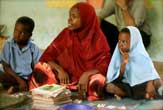AU women and gender experts adopt key instruments

African Union (AU) experts on women and gender affairs will submit their recommendations to establish the African Union Women’s Trust Fund feasibility study, the African Union Commission Gender Action Plan, and the Roadmap for the African Women’s Decade: 2010-2020 to ministers in charge of gender and women’s affairs on 21 November. In order to disseminate and monitor the implementation of the Action Plan the meeting proposed using faith-based groups, imams, and the media to sensitise and transmit messages to women and society at large.
African Union (AU) experts of Women and Gender Affairs ended their meeting which started on November 13 in Banjul, The Gambia by adopting the African Union Women’s Trust Fund feasibility study, the African Union Commission Gender Action Plan, and the Roadmap for the African Women’s Decade: 2010-2020.
In setting up the Fund, the study proposes that the AU adopts a combination of endowment and programmatic approaches for sustainability. The Fund would serve the AU as an instrument for resource mobilization, donor coordination in support of gender equality and women’s empowerment and to enhance policy dialogue. It will be also a grant making facility providing support in the four identified priority areas.
In this regard, the experts recommended the AU Commission as the best option for the management and delivery of the fund with flexibility to borrow from other options. They also recommended voluntary contribution and financial strategies to further strengthen the AU’s capacity to leverage more resources from diverse sources for consideration by the AU Ministers of Gender and Women’s Affairs for approval and endorsement by the Executive Council. The meeting agreed to rename the fund by African Union Fund for Women. On the Roadmap for the African Women’s Decade: 2010-2020, aimed at advancing gender equality by accelerating implementation of Dakar, Beijing, and AU Assembly Decisions on Gender Equality and Women’s Empowerment (GEWE), the meeting agreed to implement it via three phases.
The first phase would run through 2010-2014. The activities during this period would include, conducting a baseline survey on the status of women at the national level. The launch of the African Union Fund for Women would be done at national level through the creation of National Gender Equality Fund. The period will focus on gender based corporate social responsibility to re-engineer the private sector to concentrate on issues that affect women and allocate resources to meet such needs.
The second phase will focus on the continuation of implementation of the decade activities. The thematic identification and selection of themes to reflect the emerging issues such as violence against women, climate change and collaboration with men on gender equality processes will be crucial. A mid-term review of the Decade activities will be envisaged and indicators developed to measure progress.
The third phase would be the final review and evaluation of the Decades’ programmes and output.
Regarding the Gender Action Plan (GAP), it is aimed mainly at creating and enabling a stable environment, settling legislation, and legal protection actions against discrimination for ensuring gender equality. AU experts recommended to reconcile between the past, the present and future activities in order to make sure that all planned activities were actually achieved. On mobilization of stakeholders for implementing the AU Gender Policy, the meeting proposed the use of faith based groups, Imams and the media to sensitize and transmit messages to women and the society at large in order to disseminate and monitor the implementation of the Action Plan.
It was further suggested that more emphasis should be put on grassroots stakeholders for better impact at the community level hence the need to focus on bottom up rather than top down approaches. In terms of gender mainstreaming tools, the meeting urged the AU Commission to learn from Member States that had already developed these tools and use what already existed at the national level. The recommendations of the AU experts will be submitted to Ministers in charge of gender and women’s affairs on 21 November for adoption.
BROUGHT TO YOU BY PAMBAZUKA NEWS
* This article was first published by the African Press Organization.
* Please send comments to [email protected] or comment online at Pambazuka News.
